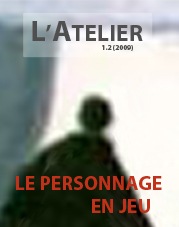Signer Bartleby : le devenir-personnage de la philosophie
Keywords:
Deleuze, Gilles, Melville, Herman, Bartleby, Personnage, Concept, philosophieAbstract
Cet article traite des rapports que la philosophie entretient avec la littérature à partir d'un exemple : la lecture que Gilles Deleuze fait de « Bartleby » — et, en même temps, de Bartleby. Il examine les démêlés de la philosophie avec le concept de personnage (et, singulièrement, de personnage principal) dans l'usage même de la notion, introduite par Deleuze et Guattari, de personnage conceptuel.
Il suggère que le concept de personnage est l'un des éléments qui retient l'approche deleuzienne (et la critique en général) de se tourner vers l'impensé de la création littéraire, illustré par l'énigmatique agencement énonciatif de la nouvelle de Melville.
Based on the singular example of Deleuze's reading of “Bartleby” — or, rather, Bartleby — this paper deals with philosophy's complex relationship to literature. It focuses on the problematic use of the concept of character at the heart of Deleuze and Guattari's notion of conceptual character (personnage conceptuel), suggesting that it is a theoretical blind spot diverting Deleuze's reading from the issue of literary creation which the story's particular enunciative frame points to.
Published
Issue
Section
License
- Work submitted for publication must be original, previously unpublished, and not under consideration for publication elsewhere. If previously published figures, tables, or parts of text are to be included, the copyright-holder's permission must have been obtained prior to submission.
- Authors of accepted manuscripts will assign to L'Atelier the right to electronically distribute their article, or publish it in any form (Internet, CD ROM, printed copy) but authors will retain copyright and, after the article has appeared in L'Atelier, authors may republish their text (in print and/or electronic form) as long as they clearly acknowledge L'Atelier as the original publisher.


